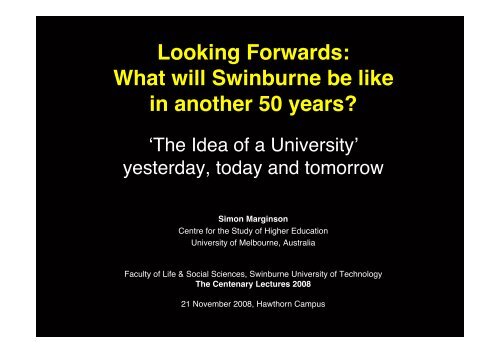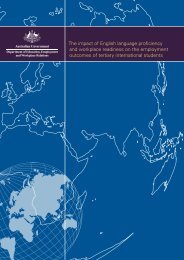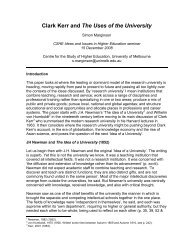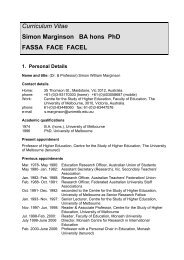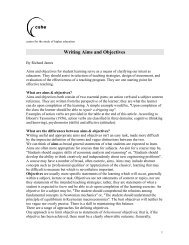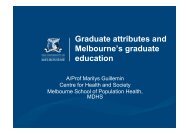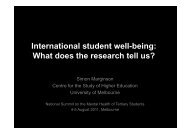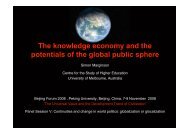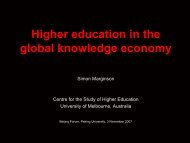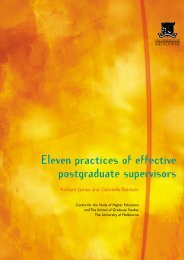Swinburne Lecture 21 November 2008 - Centre for the Study of ...
Swinburne Lecture 21 November 2008 - Centre for the Study of ...
Swinburne Lecture 21 November 2008 - Centre for the Study of ...
You also want an ePaper? Increase the reach of your titles
YUMPU automatically turns print PDFs into web optimized ePapers that Google loves.
Looking Forwards:<br />
What will <strong>Swinburne</strong> be like<br />
in ano<strong>the</strong>r 50 years<br />
ʻThe Idea <strong>of</strong> a Universityʼ<br />
yesterday, today and tomorrow<br />
Simon Marginson<br />
<strong>Centre</strong> <strong>for</strong> <strong>the</strong> <strong>Study</strong> <strong>of</strong> Higher Education<br />
University <strong>of</strong> Melbourne, Australia<br />
Faculty <strong>of</strong> Life & Social Sciences, <strong>Swinburne</strong> University <strong>of</strong> Technology<br />
The Centenary <strong>Lecture</strong>s <strong>2008</strong><br />
<strong>21</strong> <strong>November</strong> <strong>2008</strong>, Hawthorn Campus
Newman was <strong>the</strong> founding rector <strong>of</strong><br />
University College, Dublin, Ireland
ʻ … here are two methods <strong>of</strong> Education; <strong>the</strong> end <strong>of</strong> <strong>the</strong> one is to be philosophical, <strong>of</strong> <strong>the</strong> o<strong>the</strong>r to be<br />
mechanical; <strong>the</strong> one rises towards general ideas, <strong>the</strong> o<strong>the</strong>r is exhausted upon what is particular and<br />
external. Let me not be thought to deny <strong>the</strong> necessity, or to decry <strong>the</strong> benefit, <strong>of</strong> such attention to<br />
what is particular and practical, as belongs to <strong>the</strong> useful or mechanical arts; life could not go on<br />
without <strong>the</strong>m; we owe our daily welfare to <strong>the</strong>m; <strong>the</strong>ir exercise is <strong>the</strong> duty <strong>of</strong> <strong>the</strong> many, and we owe<br />
to <strong>the</strong> many a debt <strong>of</strong> gratitude <strong>for</strong> fulfiulling that duty. I only say that Knowledge, in proportion as it<br />
tends more and more to be particular, ceases to be knowledgeʼ.<br />
~ JH Newman, The Idea <strong>of</strong> a University, 1852 (1982), p. 85
Clark Kerr was President <strong>of</strong> <strong>the</strong><br />
University <strong>of</strong> Cali<strong>for</strong>nia system
ʻThe basic reality, <strong>for</strong> <strong>the</strong> university, is <strong>the</strong> widespread recognition that new<br />
knowledge is <strong>the</strong> most important factor in economic and social growth. We are just<br />
now perceiving that <strong>the</strong> universityʼs invisible product, knowledge, may be <strong>the</strong> most<br />
powerful single element in our culture, affecting <strong>the</strong> rise and fall <strong>of</strong> pr<strong>of</strong>essions and<br />
even <strong>of</strong> social classes, <strong>of</strong> regions and even <strong>of</strong> nationsʼ.<br />
~ Clark Kerr, The Uses <strong>of</strong> <strong>the</strong> University, 1962 (2001), p. xii
ʻThe “Idea <strong>of</strong> a University” was a village with its priests. The “Idea <strong>of</strong> a Modern University”<br />
was a town – a one-industry town – with its intellectual oligarchy. “The Idea <strong>of</strong> a<br />
Multiversity” is a city <strong>of</strong> infinite variety. Some get lost in <strong>the</strong> city; some rise to <strong>the</strong> top within<br />
it; most fashion <strong>the</strong>ir lives within one <strong>of</strong> its many subcultures. There is less <strong>of</strong> a sense <strong>of</strong><br />
community than in <strong>the</strong> village but also less sense <strong>of</strong> confinement. There is less sense <strong>of</strong><br />
purpose than within <strong>the</strong> town but <strong>the</strong>re are more ways to excelʼ.<br />
~ Clark Kerr, The Uses <strong>of</strong> <strong>the</strong> University, 1962 (2001), p. 31
Stan<strong>for</strong>d<br />
University<br />
University <strong>of</strong> Cali<strong>for</strong>nia,<br />
Berkeley<br />
Students at <strong>the</strong> Kennedy School,<br />
Harvard University
The Global Research University (GRU)
Shanghai Jiao Tong University global<br />
university research rankings: weightings<br />
criterion<br />
weighting<br />
Alumni <strong>of</strong> institution: Nobel Prizes and field medals<br />
Staff <strong>of</strong> institution: Nobel Prizes and field medals<br />
High citation (HiCi) researchers<br />
Articles in Nature and Science<br />
Articles in science and social science citation indexes<br />
Research per<strong>for</strong>mance (as above) per head <strong>of</strong> staff<br />
10%<br />
20%<br />
20%<br />
20%<br />
20%<br />
10%<br />
total<br />
100%
Times Higher global university<br />
rankings: weightings<br />
criterion<br />
ʻPeer reviewʼ (survey)<br />
ʻGlobal employerʼ review (survey)<br />
Internationalization <strong>of</strong> academic staff (proportion)<br />
Internationalization <strong>of</strong> student body (proportion)<br />
Student-academic staff ratio<br />
Research citations per head <strong>of</strong> academic staff<br />
weighting<br />
40%<br />
10%<br />
5%<br />
5%<br />
20%<br />
20%<br />
total<br />
100%
Pr<strong>of</strong>ile <strong>of</strong> <strong>the</strong> Global Research University<br />
TWO ‘INNER’ PRODUCTIVE FUNCTIONS<br />
1. Production and dissemination <strong>of</strong> research and knowledge<br />
2. Formation <strong>of</strong> students as self-<strong>for</strong>ming individuals<br />
THAT ARE THE FOUNDATION OF THREE FUNCTIONS IN THE LARGER RELATIONAL SETTING<br />
3. Contributions to modernization and development<br />
4. Global public goods (collective benefits <strong>of</strong> higher education)<br />
5. Regulation <strong>of</strong> educational and social opportunity
World top 100 research universities <strong>2008</strong><br />
Shanghai Jiao Tong University Institute <strong>of</strong> Higher Education<br />
Australia<br />
3%<br />
Switzerland<br />
3%<br />
France<br />
3%<br />
Sweden<br />
4%<br />
Canada<br />
4%<br />
Japan<br />
4%<br />
Ne<strong>the</strong>rlands<br />
2%<br />
Denmark<br />
2%<br />
o<strong>the</strong>rs<br />
4%<br />
USA<br />
54%<br />
O<strong>the</strong>rs (one each):<br />
Israel, Norway,<br />
Finland, Russia<br />
Germany<br />
6%<br />
UK<br />
11%
Annual rate <strong>of</strong> growth <strong>of</strong> scientific<br />
publications, 1995-2005<br />
United States National Science Bureau data, <strong>2008</strong><br />
18.0<br />
16.0<br />
16.5<br />
15.7<br />
14.0<br />
12.0<br />
13.9<br />
12.2<br />
10.0<br />
8.6<br />
8.0<br />
6.0<br />
5.3<br />
4.5<br />
4.0<br />
2.0<br />
0.0<br />
2.3<br />
2.0 1.8 1.7<br />
0.6<br />
0.0<br />
China<br />
South Korea<br />
Taiwan China<br />
Singapore<br />
Thailand<br />
Malaysia<br />
India<br />
world average<br />
Australia<br />
European Union<br />
Japan<br />
USA<br />
UK
Shares <strong>of</strong> world output:<br />
1978<br />
o<strong>the</strong>r<br />
29.4%<br />
China<br />
4.9% India<br />
3.3%<br />
Japan<br />
7.6%<br />
Western Europe<br />
24.2%<br />
Russia<br />
9.0%<br />
USA<br />
<strong>21</strong>.6%
Shares <strong>of</strong> world output:<br />
2030<br />
o<strong>the</strong>r<br />
29.2%<br />
China<br />
23.1%<br />
Russia<br />
3.4%<br />
India<br />
10.4%<br />
Japan<br />
3.6%<br />
USA<br />
17.3%<br />
Western Europe<br />
13.0%
Languages with 100 million<br />
speakers or more<br />
1200<br />
1000<br />
800<br />
600<br />
400<br />
200<br />
0<br />
English<br />
Putonghua (Mandarin)<br />
Hindi/ Urdu<br />
Spanish<br />
Russian<br />
Arabic<br />
Bangla<br />
Portuguese<br />
Malay/ Indonesian<br />
Japanese<br />
French<br />
German
http://www.cshe.unimelb.edu.au/people/staff_pages/Marginson/Marginson.html<br />
Published by<br />
Peter Lang, New<br />
York, early 2009<br />
Published by Peter<br />
Lang, New York, late<br />
2009


